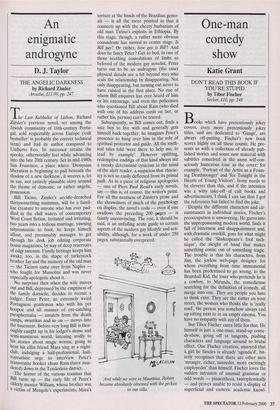An enigmatic androgyne
D. J. Taylor
THE ANGELIC DARKNESS by Richard Zimler Arcadia, £11.99, pp. 247 The Last Kabbalist of Lisbon, Richard Zimler's previous novel, set among the Jewish community of 16th-century Portu-- gal, sold respectably across Europe (`cult bestseller' is probably the correct technical term) and had its author compared to Umberto Eco. Its successor retains the spooky, otherworldly feel while advancing into the late 20th century.-Set in mid-1980s San Francisco, a place where 'Dionysian liberation is beginning to pall beneath the shadow of a new darkness', it weaves a, let us say, not entirely plausible story around the theme of demonic, or rather angelic, possession.
Bill Ticino, Zimler's accidie-drenched thirtysomething mainman, will be a famil- liar creature to anyone who has ever pad- dled in the chill waters of contemporary West Coast fiction. Irritated and irritating, two years into a tedious marriage, yawning satyromaniac to boot, he keeps himself afloat, and presumably manages to get through his desk job editing corporate house magazines, by way of deep reservoirs of edgy sarcasm. Family heritage keeps him awake, too, in the shape of turkeycock brother Jay and the memory of the old man — the Ticinos came over from Naples who fought for Mussolini and was never especially apologetic about it. No surprises then when the wife moves out and Bill, depressed by the emptiness of the family domicile, decides to recruit a lodger. Enter Peter, an extremely weird Portuguese gentleman who with his pet hoopoe and all manner of eye-catching paraphernalia — amulets from the death camps, swastikas and so on — moves into the basement. Before very long Bill is thor- oughly caught up in his lodger's dense and semi-numinous world, listening avidly to his stories about magic worms, going to hear his elfin friend Mara sing at a night- club, indulging a half-professional, half- voyeuristic urge to interview Peter's transvestite hooker chum Rain (later mur- dered) down in the Tenderloin district.
The horror of the various traumas that Bill turns up — the early life of Peter's elderly mentor William, whose brother was a victim of Mengele's experiments, Mara's torture at the hands of the Brazilian gener- als — is all the more pointed in that it connects up with the cheery barbarism of old man Ticino's exploits in Ethiopia. By this stage, though, a rather more obvious conundrum has moved to centre stage. Is Bill gay? Or rather, how gay is Bill? And does he fancy Peter? Got to bed, in one of those seething convolutions of limbs so beloved of the modern gay novelist, Peter turns out to be an androgyne (the exact physical details are a bit' beyond me) who seals the relationship by disappearing. Not only disappearing, but turning out never to have existed in the first place. No one of whom Bill enquires has ever heard of him or his entourage, and even the policemen who questioned Bill about Rain (who died with one of his address cards on her, or rather his, person) can't be traced. Subsequently, as Bill comes out, finds a nice boy to live with and generally gets himself back together, he imagines Peter's presence to hang over him in the role of spiritual protector and guide. All the myth- ical tales told 'were there to help me, to lead by example'. However uplifting, redemptive endings of this kind always stir a sneaky determinist cynicism in the mind of the alert reader, a suspicion that charac- ter is not so easily deflected from its primal path. As in a piece of religious apologetics — one of Piers Paul Read's early novels, say — this is, of course, the writer's point. For all the neatness of Zimler's prose and the shrewdness of much of the psychology on display, the novel's coda — even if one swallows the preceding 200 pages — is faintly unconvincing. The rest, it should be said, is an unfailing acute guide to certain aspects of the modern gay lifestyle and sen- sibility, although, for a work of under 250 pages, substantially overpriced.
And while we were in Mauritius, Robert became absolutely obsessed with the geckos in our villa.'


































































 Previous page
Previous page